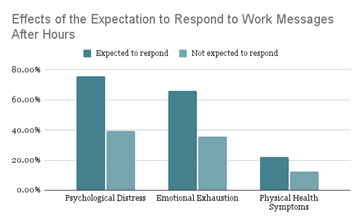Article: Refresh Yourself

Refresh Yourself - Not Your Email
By Ali Branham, BYU Campus Ambassador
Beep. Beep. Beep. It’s your 6:15 alarm. You welcome Tuesday morning with a groan. You reach your arm over to the bedside table, unplug your phone, and refresh your email. Your manager asks you to finish up a report today. Your boss requests your attendance at a conference next month. After responding to these emails, you open your messages. Your coworker texts you saying he is only working a half-day. After responding with a polite “sounds good,” you notice it’s already 6:45. You hurry to work. You clock in, work 8 hours, and clock out. Once you’re home, you eat dinner and refresh your email. Sound familiar? In this article I will discuss the benefits of disconnecting from work after work hours and reconnecting with yourself and your family.
Personal Benefits
Completely unplugging from work after hours has significant personal benefits. When you are free from the weight of answering emails and messages, you will be able to truly decompress from the stress of the workday. This kind of stress management promotes long-term health. Chronic stress can lead to health issues like hypertension and obesity, so take some time to reset and re-energize after work by leaving those work emails for next time you’re in the office (Murray Brown).
When you disconnect from work after leaving the office, this leads to not only long-term health benefits, but also short-term health benefits. A study conducted by the University of South Australia administered a survey measuring the levels of psychological distress, emotional exhaustion, and physical health symptoms in individuals who had supervisors who expected them to answer messages after hours and those who did not.
Those who had the expectation to respond experienced more psychological distress (70.4% compared to 45.2%), emotional exhaustion (63.5% compared to 35.2%), and physical health symptoms, such as headaches and back pain (22.1% compared to 11.5%) (Zadow). The graph “Effects of the Expectation to Respond to Work Messages After Hours” illustrates the study’s research.
Employees who are expected to answer work messages at home trend higher in all three of these problems. Assuming the individuals who do not have the expectation to respond to messages after work hours are less likely to interact with work emails and messages at home, the study suggests that these employees are happier, more energized, and healthier. This is due to the finding that they are statistically less psychologically distressed, emotionally exhausted, and physically ill.
A study done by the University of Mannheim also concludes that employees who detach from work during their off-hours experience less psychological distress (Weir). One woman in the finance industry testified that taking time without looking at her work phone, helped her re-energize and be more successful in her personal life (Welcome to). This combination of lower stress, exhaustion, and illness and higher energy and success must be why the same employees in the University of Mannheim study reported the benefit of high life satisfaction from unplugging from work.
Employer Benefits
When an employer unleashes its employees from the electronic tether after work, the personal benefits for the employee pass on to the employer. “Always-on work culture” drains employee morale when they are out of and in the office (Von Bergen). Employees return to work refreshed and happier if they disengage from work when they are home. If you have a group of employees who are generally happier, less stressed, and have higher morale this will foster an improved office culture.

One researcher partnered with the Boston Consulting Group to conduct a small experiment. They found that even turning off their work phones for one night out of the week made a positive difference in office culture. They noticed that after implementing this change, “The company was better able to recruit and retain employees” (Owens).
More work, like work away from the office, does not equal better work. When employees return to work without sufficient disconnection from work responsibilities, they return to the office fatigued, and fatigued employees are not productive employees (Von Bergen). The same research with the Boston Consulting Group also concluded that in addition to better morale and office culture, employees were also more engaged, efficient, and collaborative (Owens). Having happy, refreshed, and productive employees during work hours is better than having fatigued and unhappy employees at your disposal 24/7.
Family Benefits
Disconnecting from work after hours allows you to reconnect with your family. Spending quality time, without work distractions, with your spouse and/or children is crucial. Individuals who overextend themselves with work have higher levels of familial conflict (Von Bergen). No one wants a distracted, workaholic spouse or parent; being present with your family will foster those long-lasting, healthy relationships we desire.
One woman shared a reason why she strives to unplug from work when she is home. She shares, “Work and family are both important parts of life and you will find pride in showing the next generation that being a good parent and successful in your career are both valuable” (Welcome to). This is a worthwhile sentiment. How empowering is it to think about setting an example of a proper work-family balance for our children?
More Ways to Refresh
Without responding to work emails and messages all day, free time opens up. Spend this time relaxing, developing yourself, and growing relationships. To relax, consider meditating, reading, listening to music, or exercising. Exercise can also aid in developing your sense of self, and other hobbies such as cooking and crafting can do this too. Spending uninterrupted, quality time with your spouse, family, and friends will strengthen these relationships and your sense of belonging.
When you “get off work,” really, get off work. Instead of habitually checking your work messages and email, spend time doing activities that will improve your work-life balance and enrich your life. You will be a less stressed and tired, more happy and productive, best version of yourself. So, please, refresh yourself, not your email.
